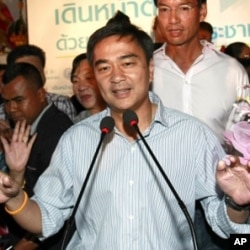Thailand’s early election results indicate the opposition Pheu Thai party led by Yingluck Shinawatra, and backed by her brother, former prime minister Thaksin Shinawatra, has won a majority. Pheu Thai defeated the ruling Democrats of Prime Minister Abhisit Vejjajiva and, although official results are not expected until Monday, Abhisit accepted defeat and congratulated his rival.
Thailand’s main opposition Pheu Thai party dominated Sunday’s nationwide election, the first in four years.
The contest was mainly between the ruling Democrats of Prime Minister Abhisit Vejjajiva and the opposition Pheu Thai, led by Yingluck Shinawatra, the younger sister of former prime minister Thaksin Shinawatra.
Even before official results were in, exit polls indicated Pheu Thai won a comfortable majority of seats in parliament.
The victory marks a dramatic political reversal for Thaksin and his allies nearly five years after he was forced from power in a military coup.
Abhisit accepted defeat and congratulated Yingluck Shinawatra on national television, welcoming her as Thailand’s first female prime minister. But he said the Democrats would continue to oppose Pheu Thai’s plan to grant amnesty to politicians, including Thaksin.
He says they worked very hard for more than two years and he wants to thank everyone. From today, he says, he wishes to see unity, reconciliation, and for the new government to do as promised. He says the Democrats will be a constructive opposition party in the parliament, but will oppose any attempt to grant amnesty to any individuals.
Yingluck is widely viewed as a proxy for her brother who, despite being twice popularly elected, was ousted by the military in 2006 over concerns he was growing too powerful.
|
Thaksin Shinawatra has spoken out on the election results from Dubai. As VOA's Ira Mellman report, he discussed his possible future involvement in the new government, but said he is in no hurry to return to Thailand.
|
Thaksin critics say he was corrupt, authoritarian, and disloyal to Thailand’s revered monarchy. He denies all the charges and in 2008 fled into exile to avoid a jail sentence for corruption.
Nonetheless, in the past four general elections Thailand voted overwhelmingly for Thaksin or parties aligned with him.
But controversial court orders dissolved those governments for election fraud and banned their leaders from office for five years.
Speaking on national television from Pheu Thai headquarters, Yingluck vowed to fulfill all her campaign promises and not to disappoint the people.
She says a lot of difficult missions are ahead. For example, she says, solving people’s problems making a living, the economy, and leading the country to unity and reconciliation. She says they must also develop Thailand and move the country forward.
But that may be easier said than done, especially if the amnesty goes ahead and Thaksin is allowed to return to Thailand.
He is a divisive figure, both hated and feared by Bangkok elites.
Since the 2006 coup, Thailand has seen sporadic street protests and violence in a power struggle between his rural and working class supporters and Bangkok’s traditional rulers and the military.
Yellow Shirt protesters claiming to protect the monarchy pressured Thaksin-aligned governments in 2008 by surrounding parliament and then taking over Bangkok’s airports.
Last year, clashes between soldiers and armed elements among Thaksin’s Red Shirt protesters left 90 people dead, most of them civilians.
Observers worry the election victory by Thaksin’s sister could lead to further demonstrations by Yellow Shirts or perhaps another military coup. Thailand’s army chief repeatedly said before the election that there would be no more coups.
Thailand has had 18 coups or attempted coups since becoming a constitutional monarchy in 1932.





